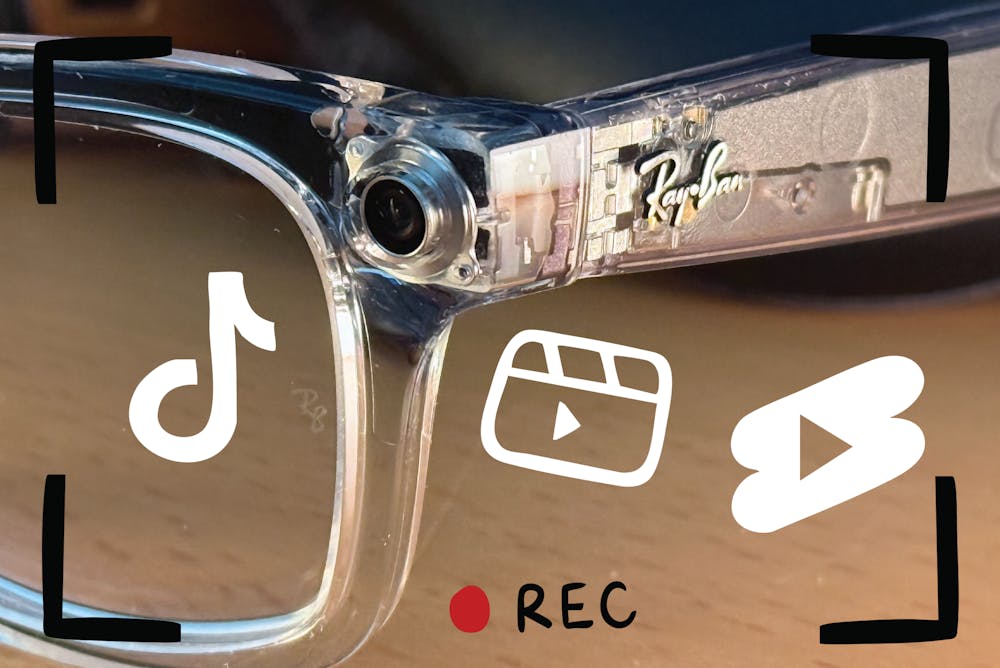Ro Villar, a senior studying nursing, was approached by two strangers asking for her number while she was on a shift at her job as a Devils' Advocates tour guide. While she engaged in conversation with the strangers, she noticed the sunglasses they were wearing.
At that moment, she realized she was being recorded and pointed it out.
The strangers deflected, and the conversation carried on for nearly three minutes. Later, it was posted to a public TikTok account.
"My friend sent me (the) video, and I was like, report that," Villar said.
Villar said she felt "creeped out" and "appalled" that she was secretly recorded while at work.
"I've seen these videos before, and I know they usually don't back off until you give them something," Villar said. "So when they asked for my number, I just put in a random phone number."
Villar said the people who recorded her said they were promoting something for a marketing class, but didn't give any other details.
"I kept seeing them after," Villar said. "I kept bumping into them, and they would just sit outside Taylor Mall."
Gabriella Zwall, a senior studying dietetics, also had a similar experience while she was on a shift as a tour guide. Zwall said she did not realize she was on camera until after the video was posted on TikTok.
"Street interviews can be done respectfully," Zwall said. "If someone says no, that's the answer, and if you can accept that, that's all there is to it."
Both Villar and Zwall said the videos they were in were reported on the TikTok app, but the videos are still up on the account and have amassed over 26,000 views combined. Other videos on campus from the same account have garnered hundreds of thousands.
ASU students are no strangers to street interviews — what makes this instance unique is that most of its subjects are unaware they are being recorded until a video is posted to a public account on TikTok.
READ MORE: The truth behind college vloggers: an insight into what it’s like being posted by influencers
The account, @johnnystuddd, appears to be run by an ASU student. Most of the videos on the page feature the owner of the account approaching people around the downtown Phoenix and Tempe campuses, seemingly without the subjects' knowledge.
The structure of each video is simple: A person recording with smart glasses approaches a stranger, usually a woman, to ask for her number. When faced with rejection, the person continues small talk until the one being recorded leaves. These interactions often take place on ASU campuses, but also in other public spaces such as stores and parking lots.
The State Press reached out to the account via social media but they did not respond to a request for comment.
"It is unethical," Zwall said. "It was harassment. There's no if ands or buts; they were told no, they continued after they were told no, and they recorded the whole time. They harassed multiple people."
Raees Mohamed, an internet and corporate lawyer, wrote it is likely harassment if the interviewer continues after the interviewee says, "stop talking to me."
K Royal, a faculty associate at the Sandra Day O'Connor College of Law with a specialization in privacy law, said recording people in public is generally legal.
"In the privacy world, anything you do in public is generally not considered private," Royal said. "I would say that kind of hidden recording is probably still legal. In some states, there is a right to publicity."
Royal said a right to publicity means having a legal right to use someone's voice or likeness for commercial purposes, which could include street interviewing.
Arizona is a one-party consent state, which means that only one party must be aware of recording and be present for the entire conversation.
Royal also said there are a lot of details that may differ based on the age of the person being recorded, where the person is recorded and many other factors.
Royal explained that though it may be legal, many in the videos feel it is unethical.
"We might personally consider them unethical, but there would not be a hard rule around ethics on it," Royal said.
Royal also said people practicing street interviews should use discretion to determine whether a clip should be posted online.
Despite Arizona being a one-party consent state, Villar said people should still ask for consent before recording to promote comfortability and decency toward others.
"Ask for consent," Villar said. "It'll make you feel better as a person."
Edited by Andrew Dirst, Sophia Braccio, Alexis Heichman and Katrina Michalak.
Reach the reporter at ktale@asu.edu and follow @KasturiTale on X.
Like The State Press on Facebook and follow @statepress on X.
Kasturi is a sophomore studying journalism. This is her third semester with The State Press. She has her own blog and has worked in creative writing.




